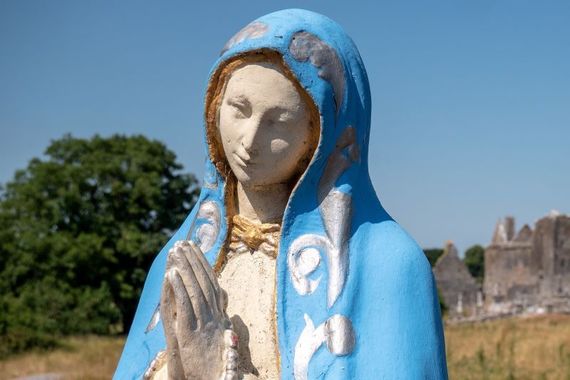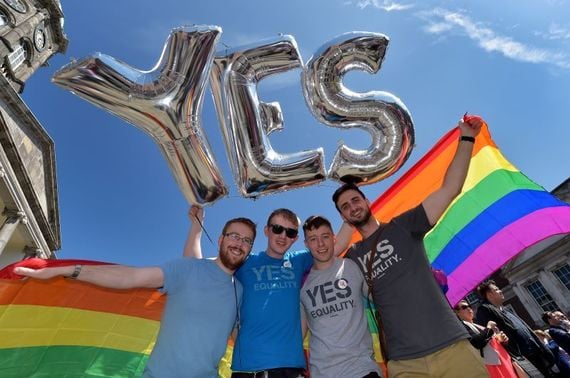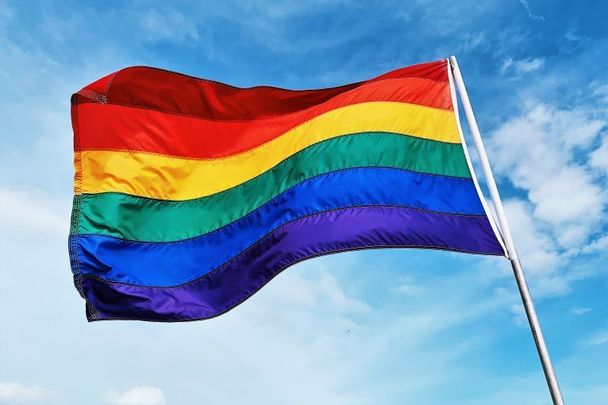For me growing up, Ireland wasn't a country, it was an argument. Everything I said and did and wanted as a gay man was a discussion other people wanted to have, not a right I could claim for myself.
One time in Ireland in the 1990s, I brought a dinner party to a crashing halt.
I really hadn't intended to, I simply offered an observation that made everyone seated at the table freeze.
Baptism is a way for a man to give birth to a child, I said simply. Then I explained precisely how: the child's head is lowered into water (that is, the water breaks) and then it reemerges born into the life of the church (a new life). It is born again. A man births it. QED.
You'd have thought I had individually slapped each seated diner with their own poached salmon, judging from the faces that were looking back at me. But still, I continued. A women's actual role in child birthing is sidelined by baptism (and that's quite important) and so through this ritual, an actual birth is being surpassed by a symbolic one.
I think I concluded my little speech by saying that all this had become clear to me by watching my cousin's christening in a draughty County Donegal church one afternoon, though at that time, I had simply kept my observations to myself. Nothing is so rare as the ability to see what is in front of your face, I concluded.

Tuam Mother and Baby Home.
When I looked up everyone was staring at me like I'd overturned the table. Insights of this nature were not only not welcome in 1990s Ireland, they were considered an unforgivable impertinence.
I mean, I could see their point: if Irish society is a successful conspiracy never to say anything very consequential, then I had just broken the nation's cardinal rule.
But it's easier to ignore social rules when they don't apply to you. This is one of the sacred duties of the 'confirmed bachelor.' When you're placed outside the social embrace, you can get your revenge by observing what was denied you. By seeing it more clearly. By counting the cost.
In the medieval times, the court jester was the person tasked with telling uncomfortable truth to the truly comfortable. In modern times, that role is now performed by novelists and homosexuals.
That's a lot to unpack, I realize, but Irish society in the '80s and '90s had quite a lot of examined material to sift through.
Back then, the thing that diverted me most, I now realize, was our national obsession with power of women and our attempts to curtail it.

The Virgin Mary. (Getty Images)
It began for me with the absurd paradox of Mary, the virgin-mother. Back in the '90s, my professors used to windily dismiss the idea of same-sex marriage by saying that two men can't conceive and I would respond by saying well Mary managed it without any men at all, and you don't consider that controversial, so why me?
People don't like it when you spot the weaknesses and contradictions in the codes they unthinkingly live by. I understand that. But when you use those unthinking codes to oppress others you should expect at least some push back, hence my dinner party speech.
For me growing up, Ireland wasn't a country, it was an argument. Everything I said and did and wanted was a discussion other people wanted to have, not a right I could claim for myself.
I needed to be carefully considered, never just allowed. From holding hands in public to expressing affection, I required the equivalent of a court order and a police cordon. It was ridiculous. It was exhausting. It was my life in those times.
But despite the particular nature of my own travails, I could always see the larger target. I was just being associated with the female – pansy, girl boy, poof, queen, etc – but the larger target was always the female herself.

Celebrations after Ireland's gay marriage referendum. (Getty Images)
Ireland built a gulag archipelago to contain women in the 20th century: their sexuality, their economic opportunities, their self-determination, their power. It's the most obvious thing about our nascent Republic in the 20th century, the amount of time spent curtailing the female in all of its manifestations.
To be associated with the female, as I was then for my orientation, was still the worst thing that could happen to a man as late as the 1990s.
So I think that Irish feminism and the LGBT movement have done the nation a remarkable service with the referendums that have helped change the social, political, and sexual landscape.
But I think that the time spent on curtailing, silencing, and vanishing women who threatened the dominant order – to wit, patriarchy – hasn't gone away at all. It would be foolish to think the threat has even been countered.
Progressives see progress as an enlightening path toward a more perfect future. But conservatives see the world as a smoking battlefield where no victory ever endures or is assured.
These are two wildly differing ways of being alive in the world. If we on the left need to learn anything now, it's to never take a victory for a fixed precedent.
Ireland has shown us that are no truths that are universally acknowledged, and that progress can be reversed, and that the battle is never won - and Irish women and gay men know it in their bones.




Comments